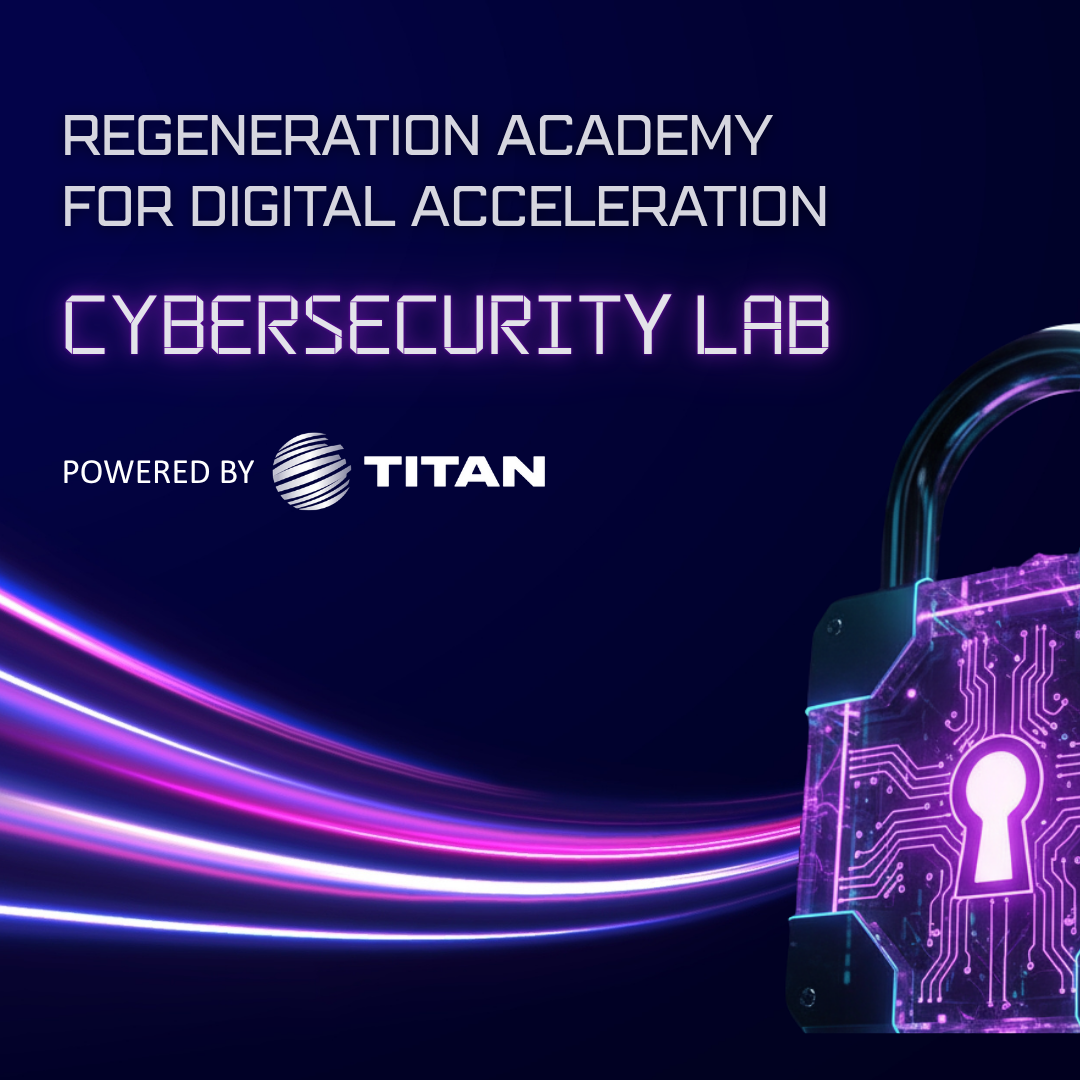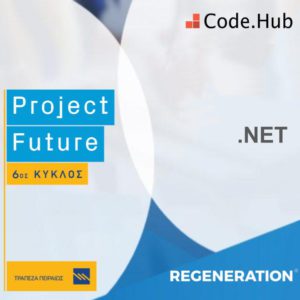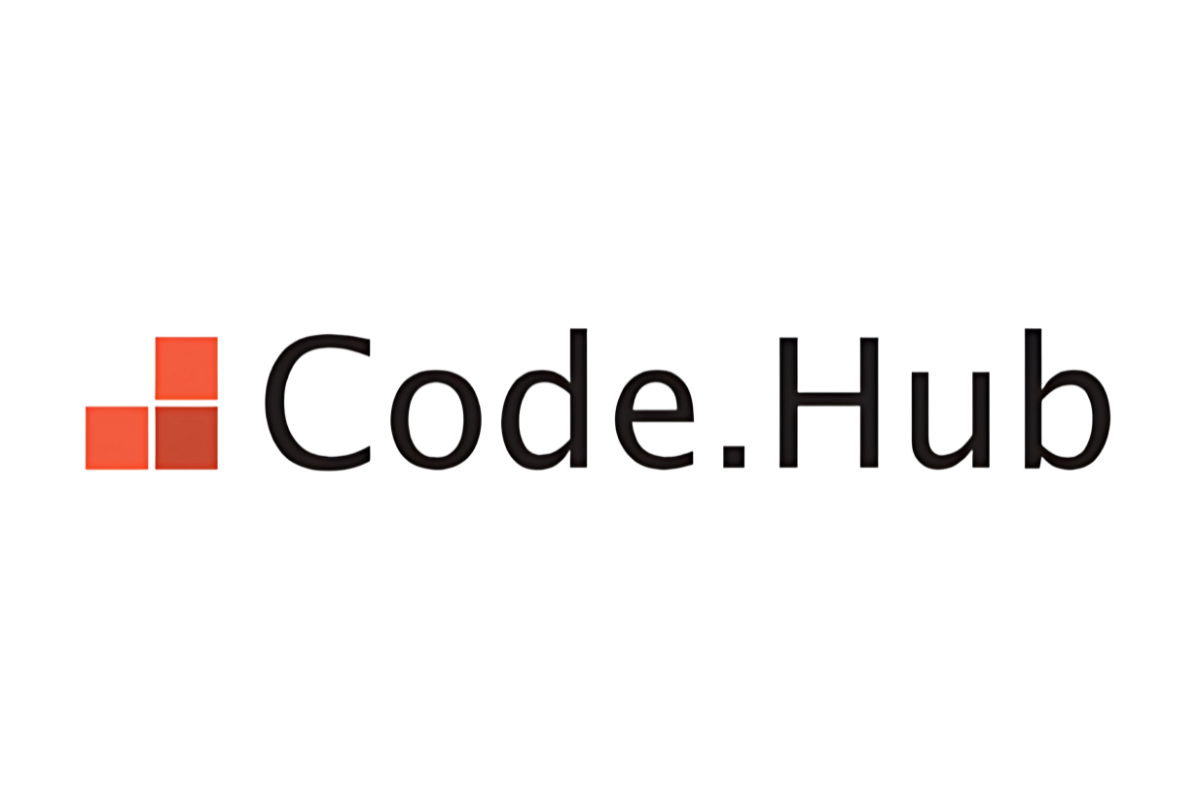
ReGeneration Academy for Digital Acceleration | Cybersecurity Lab – powered by TITAN
Purpose
The ReGeneration Academy for Digital Acceleration | Cybersecurity Lab – powered by TITAN and delivered in collaboration with Code.Hub and Athens Tech College, will equip early-career professionals with the essential knowledge and techniques to build a strong foundation in Cybersecurity, enabling them to become highly competent professionals and to thrive in this sought-after field.
The role of Cybersecurity specialists is essential in safeguarding data, systems, and infrastructures against ever-evolving digital threats. As a result, the profession has become one of the fastest-growing worldwide, with leading organizations consistently seeking skilled specialists to strengthen their resilience and support their digital trust.
Description
This intensive 100-hour program combines theoretical knowledge with practice-oriented training, focusing on cutting-edge tools, modern technologies, and best practices in cybersecurity.
It’s aimed at upskilling young talents, graduates and postgraduates, in the design, implementation, and operation of secure digital infrastructures that protect data, systems, and organizations from cyber threats.
Participants will delve into both foundational and advanced principles of Cybersecurity. The program covers a wide range of technologies and practices, including Cryptography and Data Encryption, Network and Cloud Security, Server and Virtualization Security, Identity and Access Management, Secure Data Storage, Secure Software Development and API Security, as well as Governance, Risk, and Compliance frameworks (e.g., ISO 27001, NIST, GDPR). Through practical training and extensive workshops, participants will gain hands-on experience with security tools and platforms, such as vulnerability assessment and penetration testing tools, SIEM and SOC environments, cloud-based security services (Microsoft Azure), and threat analysis techniques.
The program emphasizes applied learning, enabling participants to strengthen their technical skills while preparing them to pursue cybersecurity roles such as Security Analyst, Security Engineer, Incident Response Specialist, or Penetration Tester.
Duration & Schedule
This program lasts 10 calendar weeks (8 weeks with training and 2 weeks Christmas break) and consists of 100 hours of lectures and hands-on exercises on real case studies and projects via virtual classroom environment and online collaboration platforms.
Start Date: 1 December 2025
End Date: 6 February 2026
Detailed Schedule (*The Schedule is subject to adjustments)
| Introduction Day Monday 1, December 2025 |
Approximate (17.30-18.00) |
| Week 1 1, 3, 5 |
Weekdays – (18.00 – 21.15) |
| Week 2 8, 10, 12 |
Weekdays – (18.00 – 21.15) |
| Week 3 15, 17, 19 |
Weekdays – (18.00 – 21.15) |
| Holiday Break From 22 Dec 2025 until 6 Jan 2026 |
No sessions |
| Week 4 7, 8, 9 (Jan.) |
Weekdays – (18.00 – 21.15) |
| Week 5 12, 14, 15, 16 |
Weekdays – (18.00 – 21.15) |
| Week 6 19, 21, 23 |
Weekdays – (18.00 – 21.15) |
| Week 7 26, 28, 30 |
Weekdays – (18.00 – 21.15) |
| Week 8 2, 4, 6 (Feb.) |
Weekdays – (18.00 – 21.15) |
| Presentations Day Friday 6, February 2026 |
Approximate (18.00 – 21.15) |
Key Objectives – Curriculum
This program will present, explore and cover with extended hands-on sessions & real-life case studies the following areas:
Introduction to Cybersecurity
- Cybersecurity landscape & core principles
- Terminology, threats, vulnerabilities, and risks
- Evolution of cybersecurity, frameworks, and legal aspects
Cryptography and Data Encryption
- Symmetric vs. asymmetric encryption, hashing, digital signatures
- Public Key Infrastructure (PKI)
- TLS/SSL and secure communications
Network Security
- Network protocols and packet analysis (TCP/IP, DNS, HTTP/HTTPS, etc.)
- Network defenses: firewalls, IDS/IPS, VPNs
- Secure wireless networking (Wi-Fi, 5G, mesh)
- Secure network design principles: VLANs, Zero Trust
Server Security, Physical and Virtual Machines
- OS security for Windows & Linux (hardening, patching, logging)
- Virtualization security: risks, attack surfaces, VM escape
- Security baselines and system hardening
Cloud Principles and Security
- Cloud service models (IaaS, PaaS, SaaS) & shared responsibility model
- Identity and access management in the cloud (e.g. Azure IAM)
- Data protection in cloud: encryption, key management, Azure Key Vault
Access Control and Identity Management
- AAA principles (authentication, authorization, accounting)
- Directory services: Active Directory & Entra ID
- Advanced authentication: OAuth2, SAML, MFA, SSO, Conditional Access
Data Storage and Security
- Relational database security & access controls
- Cloud data storage and securing data at rest
- Threat mitigation techniques and best practices
Secure Software Development & API Security
- Secure Software Development Life Cycle (SDLC)
- Secure coding principles & OWASP Top 10
- Web application and API security (REST, GraphQL)
- DevSecOps & security testing in CI/CD pipelines
Governance & Compliance
- Organizational cybersecurity policies, roles & responsibilities
- Frameworks overview (ISO 27001, NIST, GDPR, SOX)
- Audit principles, logging, documentation, compliance importance
Risk Management
- Cyber risk concepts, risk appetite & tolerance
- Risk assessment methodologies, matrices & heat maps
- Risk treatment: accept, avoid, transfer, mitigate
Business Resiliency
- Business Continuity Planning (BCP) and Disaster Recovery Planning (DRP)
- RTO/RPO concepts
- Incident response planning, team roles & crisis communication
Technical Vulnerability Management
- Types of vulnerabilities: software flaws, misconfigurations, weak credentials
- Vulnerability assessment lifecycle (discover, scan, analyze, report)
- Tools demo: OpenVAS Greenbone CE, OWASP ZAP
- Intro to web application penetration testing (SQLi, XSS, session management)
Security Operations and Testing
- Security Information and Event Management (SIEM)
- Incident detection, forensics fundamentals
- SOC roles and tools overview
- Threat hunting, intelligence, packet sniffing with Wireshark
Security Awareness Training
- User education on policies and acceptable use
- Best practices against phishing, password risks, and social engineering
Emerging Technologies in Security
- Applications of AI/ML in cybersecurity
- Blockchain fundamentals and security implications
- IoT security challenges and mitigation practices
Capstone Project
- Individual project work with real-world case studies
- Deployment of a secured application with database and logging in Azure
- Setup of a vulnerability ingestion and reporting tool
- Penetration testing of an application
Conditions for Participation
Graduates of Greek or foreign schools of higher education (AEI / TEI / College), in one of the following academic directions:
- Informatics and Computer Science
- Electrical and Computer Engineering
- Networks, Telecommunications, and Systems
- Mathematics, Statistics, and Applied Mathematics, ideally with a focus on Cryptography or Information Security
- Postgraduate programs in areas related to Cybersecurity, Networking, or Computer Science
- Polytechnic Schools and Schools of Natural Sciences, ideally with a specialization in Cybersecurity or Networks
Additional Conditions:
Up to 29 years old, as the program is aimed at graduates at the beginning of their careers.
None or limited work experience:
0 to 3 years full time working experience, upon completion of studies.
Extracurricular activities:
Active involvement in extracurricular activities (eg volunteering, sports, entrepreneurship, art and any other non-academic activity).





